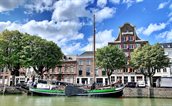Hollandse Delta district water board is exploring the impact of climate change on water quality
Clean water is among the core tasks of a district water board. Now, but especially in the future, when the climate will continue to change. The increasing heat, drought, and extreme precipitation are not only causing water shortages and water excesses: these climate trends are also jeopardising water quality. For example, surface water warming is conducive to the growth of blue-green algae. The Hollandse Delta district water board has commissioned a study into the effects of climate change on urban and rural water quality in the southwestern part of Zuid-Holland.

How has the study been conducted?
The district water board has commissioned the Waardenburg agency to conduct the study. This agency has conducted literature research and has analysed data from the Royal Netherlands Meteorological Institute KNMI and from the water board. In working sessions with the water board, the researchers have collected additional information on the current impact of drought, heat, and extreme precipitation on water quality. Subsequently, based on this information, they have conducted analyses to gain insight into the effects to be expected in the future. With respect to some components, such as salinisation, they coordinated their research with a concurrent Hydrologic study.
What are the main results?
The researchers expect that climate change will impact water quality in the Hollandse Delta area in several respects:
- Increasing eutrophication. As a result of the increasing heat, drought, and precipitation, eutrophication is increasing. This means that the water becomes progressively enriched with nutrients, which causes water quality to deteriorate. This process is conducive to, for example, the growth of blue-green algae. Cf. the paragraph on Excess nutrient content as a result of eutrophication at the bottom of the page in the Urban Water Quality knowledge dossier;
- Increasing salinisation. The rising sea level, soil subsidence, and precipitation shortages can result in brooks, canals, rivers, and other water bodies growing increasingly brackish. The researchers do not expect any large-scale salinisation in the southwest of Zuid-Holland, because this part of the country has and will continue to have sufficient fresh water for flushing these bodies of water. However, salinisation may occur at certain locations, e.g., in the smaller watercourses on the islands of Goeree-Overflakkee and Voorne-Putten. Salinisation has a negative impact on biodiversity, which adds to the risk of invasive exotic species. Salinisation could also raise the production of phosphorus in the soil. This does not pose any immediate problems for the soil, but will affect surface water quality. An excess of phosphorous and nitrate nutrients will boost algal growth, as a result of which the water will turn muddy. This will limit the habitat options for aquatic plants, fish, and other water creatures;
- Increasing stratification. This means that surface water will no longer mix with deeper water, which can result in, e.g., oxygen deprivation. Oxygen deprivation will cause fish mortality and shifting of species;
- Increasing water pollution. The concentration of microbial and chemical pollutants in the water is increasing. These pollutants are detrimental to species living in and around the surface water.
Lesson to be learned: join forces with others
The Hollandse Delta district water board is committed to improving water quality. To this end, it is creating slightly sloping, nature-friendly banks and having fresh water from the rivers flow into the polders. Furthermore, it is creating a habitat for a range of plant and animal species in ditches and canals. However, that is not enough. Climate change is forcing the water board to step up its efforts and to collaborate with other parties. That is the only way to enhance or even keep up water quality. That is why the water board is collaborating closely with municipalities and other parties, to ensure that they will also take account of water quality in their plans. For example, the warmer summers will induce larger numbers of people to engage in leisure activities in and around urban bodies of water. Ergo, it is important for us to collectively ensure that this water is healthy and safe.
Contact person
Mieke van der Laan
Waterschap Hollandse Delta
M.vanderLaan@wshd.nl